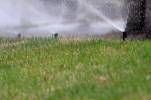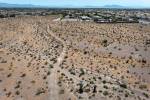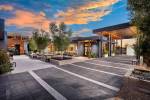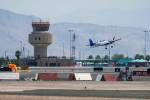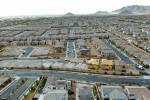Sprinkler proposal draws fire
Fire sprinklers are as common in local office buildings as earth-tone colors.
But the effort by some Clark County officials to make the sprinklers a fixture in future houses in the unincorporated areas has ignited a fierce debate.
Proponents say residential fire sprinklers should be required because they prevent property damage, reduce insurance costs by as much as 20 percent and save lives.
Critics contend that mandating the sprinklers would infringe on homeowners' rights and impose additional costs on a building industry struggling to rebound from the recession.
If passed, the code would go into effect July 5 and would require fire sprinklers to be part of a new home's design before building permits are issued. Existing homes would not be affected.
The county would be among the relatively few governments in the nation with such a code. The county already requires sprinklers in most apartment and condominium complexes and homes larger than 3,600 square feet when nearby fire hydrant pressure is too low.
The regional planning board will discuss the proposal in November and make recommendations to county commissioners.
Adopting the fire sprinkler rules would put the county in line with the most recent international building code and, in turn, lower homeowners' insurance rates, said Ron Lynn, the county's development services director.
"I'm bringing forth what I think is best for the development community," Lynn said, adding that it could pave the way for the cities to craft similar rules.
County fire officials back the proposal.
"We support the ordinance because we feel residential sprinklers, just like commercial sprinklers, save lives," Deputy Fire Chief Kelly Blackmon said in an e-mail.
But representatives of the real estate and building industries oppose mandatory fire sprinklers in homes, saying this is the worst time to increase construction costs.
"Any additional cost to the system at this point is breaking the back of it," said Rick Shelton, president of the Greater Las Vegas Association of Realtors. "They need to chase that bus when there's a robust economy."
Homeowners should be allowed to decide whether they want to spend the money on the systems, rather than having the government force them to buy the sprinklers, Shelton said.
The potential effect of the proposed code is unclear. Last year, county firefighters responded to 358 residential fires, including mobile homes. One person died, and 22 were injured, in the fires.
Cost estimates for residential fire sprinklers vary.
Lynn said national fire and building safety groups have pegged the average cost at $1.60 a square foot, about $3,200 for a 2,000-square-foot house.
The Realtors Association contends that the estimate is low because it omits plumbing, installation and maintenance work. The cost is closer to $7 to $10 a square foot, or $7,000 to $10,000 on a 2,000-square-foot house, the group argues.
Nevada Fire Protection, a local vendor that supplies fire sprinklers, does a small portion of its residential business on houses in the Las Vegas Valley, and most of those are larger custom homes, a company representative said.
The company is installing sprinklers in modest, 1,800-square-foot houses in Reno and charging about $1 a square foot, said Jason Moore, an engineer with the company.
"$7 a square foot ... I just can't imagine," Moore said, commenting on one Las Vegas estimate.
Whatever the costs, builders will pass them on to consumers for systems that are of questionable value, said Monica Caruso, spokeswoman for the Southern Nevada Home Builders Association.
Because few municipalities in the country require homes to be equipped with sprinklers, there is little information overall showing their effectiveness, Caruso said.
"Our primary concern at the moment is it's being rushed through with no discussion or dialogue," Caruso said. "There are too many questions."
California adopted a code for compulsory house sprinklers that will go into effect next year.
Scottsdale, Ariz., has required fire sprinklers in all dwellings since the mid-1980s, and about half of the homes in the city, 45,000, have sprinklers.
Realtors in Scottsdale differ from their Las Vegas counterparts.
The cost of home fire sprinklers is not too bad, said Bob Peirce , chief executive of the Scottsdale Area Association of Realtors.
"When you weigh it against the cost of a life," Peirce said.
Residential sprinklers lower homeowners' insurance by 5 percent to 20 percent, depending on the carrier, said Jim Ford, Scottsdale's fire marshal and deputy fire chief.
Ford contends the cost of installing sprinklers in new homes in Scottsdale ranges from 65 cents to $1.25 a square foot. Opponents often toss around bloated estimates such as $7 a square foot, he said, in "another attempt to scare people."
A big reason that few areas in the nation require sprinklers in houses is because homebuilders and real estate lobbyists fight the regulation in most locales, Ford said. The industry wants to avoid anything that will add more work to construction, especially in tract housing, he said.
Ford oversaw a 15-year study that looked at the effect sprinklers had on 200 fires in commercial and residential structures in Scottsdale.
Sprinklers saved 13 lives and kept structural damage to an average of $3,500 per blaze, according to the study's findings. In contrast, structures with no sprinklers sustained an average of $45,000 in damage.
Some people worry that the sprinklers will ruin a home's aesthetics and envision ugly metal heads protruding from the ceiling, Lynn said. But the heads can be made flush with the ceiling or slightly indented and can be masked.
"You don't have to have sprinkler heads poking out of anything," Lynn said.
Sean Fellows, a lobbyist for the local real estate association, argued that the cost of buying and maintaining a sprinkler system outweighs any savings in insurance.
Smoke from cooking or someone bumping a sprinkler head could set off the system accidentally, causing water damage that many insurers will not cover, Fellows said.
According to industry estimates, the potential for an accidental fire sprinkler discharge is greater than the chance of fire, Fellows wrote in a letter to county commissioners.
Homeowners are better off getting smoke alarms, which are cheaper and won't drench the house if they're accidentally triggered, he said.
Ford dismissed Fellows' arguments as inaccurate.
Fire sprinklers are not nearly as sensitive as smoke alarms, Ford said. They are designed to douse the immediate area of the flames and not shower the whole house.
He said that just one or two sprinkler heads per structure were enough to extinguish 93 percent of Scottsdale's building fires since the mid-1990s.
The systems are low-maintenance, he said. To check whether they are working, an owner simply fills a sprinkler head with water and drains it.
Ford said some industry representatives go to great lengths to impart misinformation.
"That's probably what's most upsetting to me," Ford said. "If the lobbyists and homebuilders put one-tenth of the effort into working with fire services ... we would have had these systems in homes (nationwide) 10 years ago."
Contact reporter Scott Wyland at swyland@
reviewjournal.com or 702-455-4519.


















